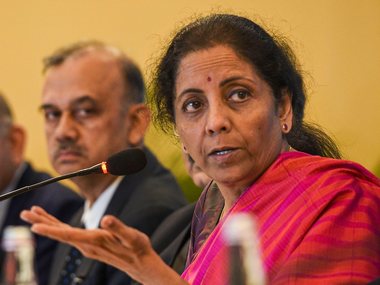More funds to fuel business. More time to meet contracts and obligations. More leniency in rules and regulations to oil the economy. There is plenty to celebrate for small and medium scale businesses and other entities covered under Finance Minister Nirmala Sitharaman’s
first package of details to flesh out Prime Minister Narendra Modi’s Rs 20-lakh-crore stimulus announced a day earlier, but the unconventional nature of the funding, the fact that there is more to come and the still-hovering threat of the COVID-19 pandemic that triggered it all are such that we can only say, as indeed the minister herself seems to say in Bollywood style: Picture abhi baaki hai, mere dost (There is more to this movie, my friend). [caption id=“attachment_8022661” align=“alignleft” width=“380”] File image of Union Minister for Finance Nirmala Sitharaman. PTI[/caption] But there is no doubt as the author
wrote earlier , that the current round of package is more of a mood lifter to reverse the freeze in the world’s fastest-growing major economy than a new deal that the prime minister’s speech smelled of. There is also an irony in the details that suggest that the high moral ground, from which the Modi administration framed the Insolvency and Bankruptcy Code to govern lending and gambled on the demonetisation of high-value currency notes, has yielded to a questionable rain of money that would hopefully bring back millions of stranded or fleeing workers to jobs and incomes. In brief, this is the triumph of macroeconomic pragmatism over moral policing of a difficult loan culture. First up,
only a third of the Rs 20-lakh-crore package amounting to 10 percent of the GDP has been unveiled so far. The
biggest chunk of this is a Rs 3,00,000-crore collateral-free credit guarantee initiative for leniently defined micro, small and medium enterprises (MSMEs) totalling 45 lakhs. This, besides a Rs 30,000-crore bond-purchase lifeline for non-banking financial companies (NBFCs), a payment guarantee for monies owed by government agencies and a Rs 90,000-crore liquidity largesse for electricity distributors against receivables are such that it is monetary policy expressed in fiscal idioms. What this means is that the effect of loan guarantees on the government balance sheet and the fiscal deficit will remain a hazy monster in the foreseeable future. Economists and analysts at credit rating agencies and multilateral organisations like the International Monetary Fund (IMF) will not find it easy to pick fiscal holes based on simple spending principles. The stimulus package also includes credit-easing measures by the RBI. Apples and oranges are mixed up all over. Banks and MSMEs will first have to see the ground reality, get into agreements, execute the funding and then boost growth in the economy. As and when that happens, it won’t be a one-shot affair. How much of the guarantee bills will actually be footed by the State? No one knows as potential defaults lie in the future. It would be wise to remember that former RBI governor Raghuram Rajan had once cautioned about potential defaults in MUDRA loans for the self-employed people. The current largesse for MSMEs seems to be a similar one but on steroids. Are we back to profligate loan-mela days? The flip side is that it was a long overdue drone-drop of money for an economy choked for demand even before the the novel coronavirus spread across the planet from Wuhan. ‘Growth first, prudence later,’ might well be a welcome slogan these days. Never mind the irony that a government that promised a clean-up act is doing this. Sitharaman has shown pragmatism in acknowledging ‘Act of God’ circumstances so that construction contracts get more elbow room and builders resume normal activity in a reasonable time. The tinkering of rules on Tax Deducted at Source (TDS), more time for Income Tax Return (ITR) filings and other such measures are like minor rubs of ointments for a wounded economy. The Rs 50,000-crore concessions in TDS payments is just a band-aid measure. The worrying part for those watching the bottom of the social pyramid is that we do not know yet how far down and how effective are the government’s Rs 1,70,000 crore handouts to the poor through the direct benefit transfers (DBT) after the virus shock. This, and the plight of the migrant workers hit by three phases of the ongoing lockdown remain largely unseen in the rain of money. We are entitled to ask the finance minister: “Will there be a new budget for 2020/2021?” In all likelihood, the answer would be yes. The virus threat is bound to alter behaviour across sectors. Service industries may feel blessed by easier loan measures announced by Sitharaman, but it is difficult now to imagine a host of secondary services, be it aviation, tourism, restaurants, or your local salon, returning to normal soon. We just have to wait while hoping that the worst is over. Long-term questions on public health lurk in the woodworks. The writer is a senior journalist and commentator. He tweets as @madversity
There is plenty to celebrate for MSMEs and other entities covered under Nirmala Sitharaman’s first package of details to flesh out Prime Minister Narendra Modi’s Rs 20-lakh-crore stimulus
Advertisement
End of Article


)

)
)
)
)
)
)
)
)



